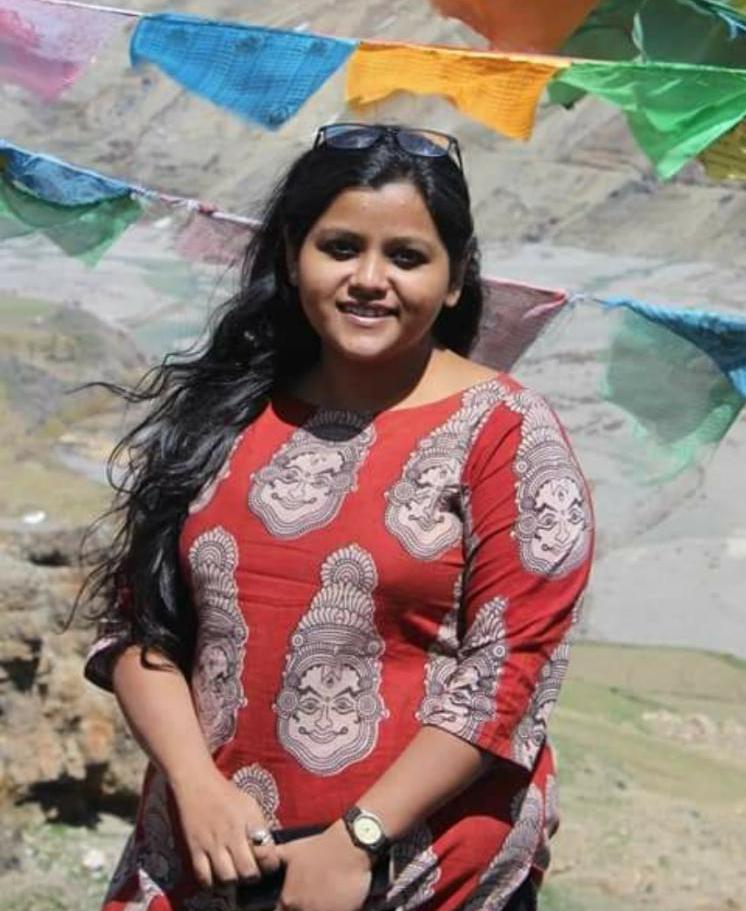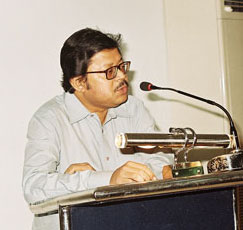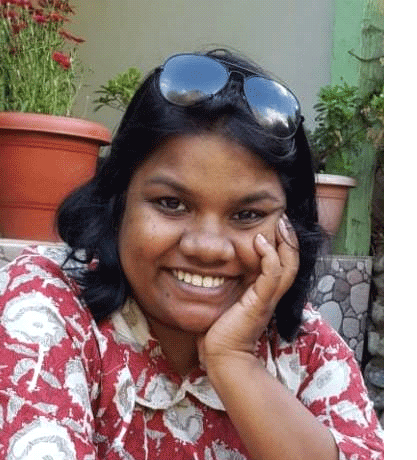Justice, Protection, and Government of the People: A Two-Year Research and Orientation Programme on Protection and Democracy in a Post-COVID World (2021-2023)
Research Segments
In-house Researchers
| Researchers | Topics | Abstracts / Full Paper | |
|
|
Shatabdi Das is Researcher at the Calcutta Research Group (CRG). She was Junior Visiting Fellow at the Institute for Human Sciences (IWM), Vienna, in Austria, in April 2022, under the ‘Europe-Asia Research Platform on Forced Migration’. She is currently doing research on urban and environmental issues and climate crisis. She has previously worked as Junior Research Fellow at the Centre for Urban Economic Studies, University of Calcutta and has also taught Geography at PG level in Sarsuna College, Kolkata (affiliated to the University of Calcutta). Shatabdi has been working with CRG since 2018 on research projects on migration studies, borderlands, displacement, environment and climate change. She was awarded Ph.D. in Geography from the University of Calcutta in 2020. Her Doctoral thesis is on ‘the impact of industrial and urban development on the environment of Asansol-Durgapur Planning Area’. |
Climate Disaster Mitigation in Coastal Megacities of India |
|
|
|
Rituparna Datta is a Researcher at Calcutta Research Group, Kolkata. Her research interests focus on migration and mobilities in colonial and postcolonial India. Her ongoing doctoral research from Centre for Informal Sector and Labour studies, Jawaharlal Nehru University looks into the health and wellbeing of coolie labour in the indentured mobilities through a gendered lens. |
Death in Diaspora: A Social History of Coolie Life in Mauritius |
|
Contracted Researchers
| Researchers | Topics | Abstracts / Full Paper | |
|
|
Anita Sengupta is Director, Asia in Global Affairs. She is an area studies specialist and has been involved with research on the Central Asian region with Uzbekistan being her area of special interest. She has also worked extensively on Turkish politics and on the Syrian refugees in Turkey. She has collaborated with scholars in a number of Universities and Institutes in Tashkent, Bishkek, Almaty, Ankara, Istanbul, Sweden, Berlin, Washington. She has been a visiting scholar in Humbolt University, part of the Swedish International Programme on Central Asia (SIPCAS) and the Nordic Network for Research on Migration, Identity, Communication and Security (MICS). She is the author of Myth and Rhetoric of the Turkish Model: Exploring Developmental Alternatives (Springer 2014) Heartlands of Eurasia: The Geopolitics of Political Space, (Lexington Books July 2009); The Formation of the Uzbek Nation-State: A Study in Transition, (Lexington Books, 2003) and Frontiers into Borders: The Transformation of Identities in Central Asia, (Hope India Publications and Greenwich Millennium Press Ltd, 2002). Her book Heartlands of Eurasia: The Geopolitics of Political Space published in 2009 was selected by the Oxford Bibliographies Online in 2011 as a must read on the section Geopolitics and Geo-strategy. Her book Symbols and the Image of the State in Eurasia has been published by Springer in October 2016. Her most recent publication is Ranabir Samaddar and Anita Sengupta (eds), Global Governance and India’s North-East; Logistics, Infrastructure and Society, Routledge, 2019. She is member of the Editorial Board of the Cambridge Journal of Eurasian Studies, Ideas and Ideals published by the Novosibirsk State University of Economics and Management and Contemporary History of Uzbekistan, published by the Academy of Sciences Uzbekistan. She is also Advisory Board member of Strategic Foresight a journal published by TASAM (Turkish Asian Centre for Strategic Studies) Istanbul and member of Editorial Board of Rising Powers Quarterly, Istanbul, International Research, Society, Politics, Economics, a journal published by the Institute of Socio-Political Research, published from Astana, Kazakhstan. She is a contributor to DNA Edit columns and contributes regularly to public debates as an expert. |
Mitigation, Recovery and Response: Democracy in Post-Covid Central Asia |
|
|
|
Paula Banerjee is a professor at the University of Calcutta and a member of the Calcutta Research Group. She is best known for her work on women in borderlands and women and forced migration. She is also the President of International Association For Studies in Forced Migration. She served as the Vice-Chancellor of the Sanskrit College and University. Winner of many awards and accolades, in 2013 she was awarded the Distinguished Fulbright SIR Award and a Visiting Professorship to SUNY, Oswego. Her recent publications include Statelessness in South Asia (2016), Unstable Populations, Anxious States (edited 2013), Women in Indian Borderlands (edited, 2012) and Borders, Histories, Existences: Gender and Beyond (2010) which has been acclaimed as a best seller. She is the editor of Refugee Watch and the editorial board member of a number of international journals such as Oxford Journal of Refugees. She has written and edited over 15 books and monographs and has published widely in international journals such as Journal of Borderland Studies, Canadian Journal of Women’s Studies, Forced Migration Review and Journal of International Studies. Acknowledged as a radical and prolific speaker she has delivered lectures in all five continents. She has been a visiting professor in a number of universities including Helsinki University (Finland), Yunnan University (China) University of Paris 7 (France) and New School, New York (USA) and others. |
Is Protection Only a Legal Matter? Migrant Labour in South and South-East Asia |
|
|
|
Sabyasachi Basu Ray Chaudhury is the Professor of Rabindra Bharati University and a member of the Calcutta Research Group. His areas of interest include South Asian studies, in particular, politics of globalisation, democracy, development, displacement, human rights and justice in South Asia. He is among the few experts on the Andaman and Nicobar Islands that India has. He is a regular contributor to academic journals, periodicals, dailies, news channels and portals. His recent publications include: The Rohingya in South Asia: People Without a State (co-authored with RanabirSamaddar), Routledge, New York, 2018; Indian Autonomies: Key Words and Key Texts, (co-edited with RanabirSamaddar and Samir Kumar Das), Sampark, Kolkata, 2005; Internal Displacement in South Asia: The Relevance of UN’s Guiding Principles, (co-edited with Paula Banerjee and Samir Kumar Das), Sage Publications, New Delhi, 2005. |
The Future of Indian Labour in the Platform Economy |
|
|
|
Samir Kumar Das is Professor of Political Science and presently the Director, Institute of Foreign Policy Studies, at the University of Calcutta, India. Formerly Vice-Chancellor of the University of North Bengal, Dean, Faculty of Arts, University of Calcutta and Adjunct Professor of the School of Foreign Service, Georgetown University, he is presently the Coordinator of the University Grants CommissionDepartmental Research Support (UGC-DRS) Programme on ‘Democratic Governance’. A Post-Doctoral Fellow of the Social Science Research Council (South Asia Program) and a Visitng Professor to Universite 13 Sorbonne Paris Cite, he specializes in and writes on issues of ethnicity, security, migration, rights, justice and democracy. |
Governing the Pandemic: Negotiating Democracy in our Time |
|
Researchers on Pandemic and Precarity
| Researchers | Topics | |
|
|
Ishita Dey is an Assistant Professor at the Department of Sociology, Faculty of Social Sciences, South Asian University, Delhi. Her research interests are migration, labor, food, and senses. She has been working on the life of sweets and sweetness in South Asia. She has co-anchored an art research project on Smells of the city, focusing on Delhi supported by Kiran Nadar Museum of Art, Delhi. She is an editorial board member of the journal Society and Culture in South Asia (Sage). She has published her work in journals such as The Sense and Society, Gastronomica, Refugee Watch, and South Atlantic Quarterly. She has co-edited the book Sustainability of Rights After Globalisation (Sage, 2011) and co-authored Beyond Kolkata : The Dystopia of Urban Imagination (Routledge, 2013). She can be reached at ishita@sau.int. She will be a Visiting Fellow at the Urban Futures Programme, University of Vienna, from 1-31 October 2023. During this period, she will be working on a publication that is an outcome of her research study - Journeys and Internal Migrant Workers: An ethnographic study of railway connectivity supported by Mahanirban Calcutta Research Group. |
|
Events / Public Lectures / Webinars
Disseminations / Resources / Important Links







